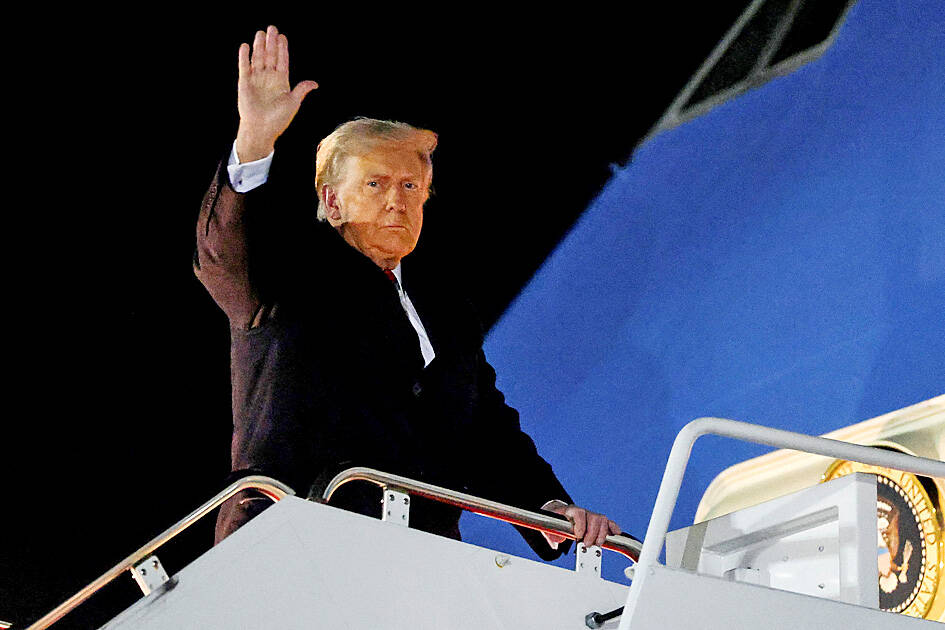The US said it held “very constructive” discussions with China after the first day of trade negotiations in Malaysia, as US President Donald Trump began his trip to the region.
Chinese and US officials met in Kuala Lumpur yesterday for a new round of talks aimed at defusing a standoff between the world’s two largest economies.
A spokesperson for the US Department of the Treasury gave a brief description of the exchange and said it would resume today, without elaborating.

Photo: Reuters
The Chinese delegation made no public remarks about the meeting.
Chinese Vice Premier He Lifeng (何立峰) led the Chinese side and was joined by Chinese Trade Representative Li Chenggang (李成鋼) and Chinese Vice Minister of Finance Liao Min (廖岷).
US Secretary of the Treasury Scott Bessent headed the US team.
Bessent and He face the task of negotiating down new escalatory measures imposed by their countries against one another. They are also setting the stage for expected talks on Thursday between Chinese President Xi Jinping (習近平) and Trump on the sidelines of the APEC summit in South Korea.
Trump told reporters aboard Air Force One that he and Xi have “a lot of things to discuss” and that he expected both sides to make compromises, although he would not put odds on getting a deal.
“They have to make concessions. I guess we would too. We’re at 157 percent tariff for them. I don’t think that’s sustainable for them, and they want to get that down, and we want certain things from them,” Trump said.
Trump has said he wants to extend a pause on higher tariffs on Chinese goods in exchange for Xi resuming US soybean purchases, cracking down on fentanyl and backing off restrictions on rare-earth exports.
Trump earlier this month lashed out against Beijing’s vow to broaden controls on rare-earth elements, raising the prospect of setting a sky-high tariff rate on Chinese goods and even canceling his first in-person meeting with Xi since he returned to the White House this year.
At stake is a trade truce that is set to run out on Nov. 10 unless extended.
Months of tentative stability in the US-China relationship have been upended over the past few weeks after Washington broadened some tech restrictions and proposed levies on Chinese ships entering US ports.
China responded with parallel moves and outlined tighter export controls on rare earths and other critical materials.
The Chinese Ministry of Commerce on Monday convened an unusually large meeting in Beijing with foreign businesses, to reassure them that its latest export controls are not meant to restrict normal trade.
The global ripples of China’s export controls underscore how the trade war has injected uncertainty into the world economy and trade. Chinese shipments to Southeast Asia and the EU have jumped this year as US tariffs soared, which might pressure local manufacturers.
Speaking at a summit of the ASEAN yesterday, Malaysian Minister of Foreign Affairs Mohamad Hasan expressed hope for a resolution while saying he has no expectation.
“We cross our fingers that the US and China come to their senses,” he said. “Very much it’s good for the whole world and also for this region.”

The combined effect of the monsoon, the outer rim of Typhoon Fengshen and a low-pressure system is expected to bring significant rainfall this week to various parts of the nation, the Central Weather Administration (CWA) said. The heaviest rain is expected to occur today and tomorrow, with torrential rain expected in Keelung’s north coast, Yilan and the mountainous regions of Taipei and New Taipei City, the CWA said. Rivers could rise rapidly, and residents should stay away from riverbanks and avoid going to the mountains or engaging in water activities, it said. Scattered showers are expected today in central and

People can preregister to receive their NT$10,000 (US$325) cash distributed from the central government on Nov. 5 after President William Lai (賴清德) yesterday signed the Special Budget for Strengthening Economic, Social and National Security Resilience, the Executive Yuan told a news conference last night. The special budget, passed by the Legislative Yuan on Friday last week with a cash handout budget of NT$236 billion, was officially submitted to the Executive Yuan and the Presidential Office yesterday afternoon. People can register through the official Web site at https://10000.gov.tw to have the funds deposited into their bank accounts, withdraw the funds at automated teller

COOPERATION: Taiwan is aligning closely with US strategic objectives on various matters, including China’s rare earths restrictions, the Ministry of Foreign Affairs said Taiwan could deal with China’s tightened export controls on rare earth metals by turning to “urban mining,” a researcher said yesterday. Rare earth metals, which are used in semiconductors and other electronic components, could be recovered from industrial or electronic waste to reduce reliance on imports, National Cheng Kung University Department of Resources Engineering professor Lee Cheng-han (李政翰) said. Despite their name, rare earth elements are not actually rare — their abundance in the Earth’s crust is relatively high, but they are dispersed, making extraction and refining energy-intensive and environmentally damaging, he said, adding that many countries have opted to

PEACE AND STABILITY: Maintaining the cross-strait ‘status quo’ has long been the government’s position, the Ministry of Foreign Affairs said Taiwan is committed to maintaining the cross-strait “status quo” and seeks no escalation of tensions, the Ministry of Foreign Affairs (MOFA) said yesterday, rebutting a Time magazine opinion piece that described President William Lai (賴清德) as a “reckless leader.” The article, titled “The US Must Beware of Taiwan’s Reckless Leader,” was written by Lyle Goldstein, director of the Asia Program at the Washington-based Defense Priorities think tank. Goldstein wrote that Taiwan is “the world’s most dangerous flashpoint” amid ongoing conflicts in the Middle East and Russia’s invasion of Ukraine. He said that the situation in the Taiwan Strait has become less stable